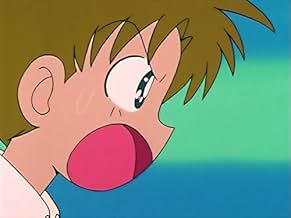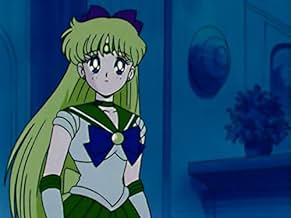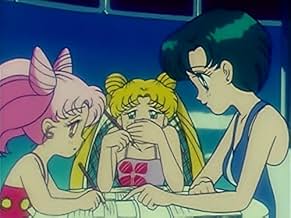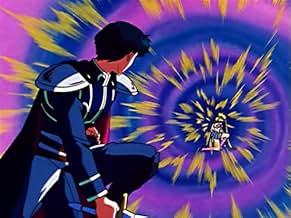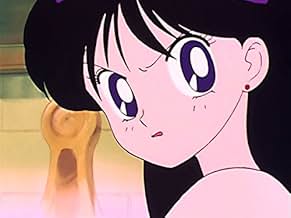Un groupe d'écolières découvre qu'elles sont des incarnations de princesses extraterrestres surpuissantes et utilise leurs capacités pour défendre la terre.Un groupe d'écolières découvre qu'elles sont des incarnations de princesses extraterrestres surpuissantes et utilise leurs capacités pour défendre la terre.Un groupe d'écolières découvre qu'elles sont des incarnations de princesses extraterrestres surpuissantes et utilise leurs capacités pour défendre la terre.
- Prix
- 2 nominations au total
Parcourir les épisodes
Histoire
Le saviez-vous
- AnecdotesThe Sailor Senshi's civilian names relate to their superhuman roles:
- the name of Usagi Tsukino is loosely translated as "Rabbit of the Moon" ("usagi" means "rabbit", and "tsuki" means "moon").This pertains to a Japanese folktale about a rabbit that can be seen in the Moon, and also to her moon-based powers.
- Chibiusa is a loose term of "little Usagi" ("chibi" means "little" or "mini"), she being Usagi's daughter and Sailor Chibi Moon (Sailor Mini Moon in the original English dub from Cloverway).
- Ami Mizuno reads "Asian Beauty of Water" ("A" means "Asian" and "mi" means "beauty", while "mizu" means "water"), which reveals her power to control water.
- Rei Hino's surname relates to fire ("hi" means "fire"), which reveals her power to control fire. The word "rei" could be translated as "beautiful", "companion", "spirit", or "soul" (the latter fits her "Fire Soul" cry), but the name "Rei" is always written in Katakana, which suggests that it doesn't have any Japanese meaning.
- Makoto Kino translates as "Tree Spirit Makoto" ( "ki" means "tree" and "spirit"), and her power is control over nature (mostly trees/lightning).
- Minako Aino reads "Beautiful Child of Love" ("mi" means "beauty" and "ko" means child, while "ai" means "love"). This pertains to Venus being the goddess of love.
- Setsuna Meioh is loosely translated as "Moment of Pluto", which alludes to her power over time ("setsuna" means "moment", while "mei" and "o" mean "dark" and "king" and are derived from "meiosei"-"Dark King Star" which describes Pluto).
- Michiru Kaioh means "Neptune Rising" ("michiru" means "rising", while "kai" and "o" mean "sea" and "king" and are derived from "kaiosei"-"Sea King Star" which describes Neptune), which alludes to her powers coming from the ocean.
- Haruka Tenoh means "Distant Uranus" ("haruka" means "distant", while "ten" and "o" mean "sky" and "king" and are derived from "tenosei"-"Sky King Star" which describes Uranus) which alludes to her powers coming from the sky/wind.
- Hotaru Tomoe is loosely translated as "Firefly of Saturn" ("hotaru" means "firefly", while "to" means "earth" and is derived from "dosei"-"Earth Star" which describes Saturn). Fireflies are associated with spirits of the dead, which allude to her power of death/rebirth.
- GaffesIn the Hebrew dub the Senshi said "Wake up" when transforming. When the studio realised that they were supposed to say "Make up" as they do in the original Japanese they decided to keep having them say "Wake up" as they felt it went better with Hebrew.
- Citations
Minako Aino - Sailor Venus: In the name of the moon, I will punish you!
Usagi Tsukino - Sailor Moon: Hey... that's my line!
- Générique farfeluIn the Hebrew dub, the extended version of "Kaze Mo, Sora Mo, Kitto!" is used in place of "Moonlight Densetsu" in the final episode.
- Autres versionsIn the first episodes in the Japanese language version, Mamorou calls Usagi "Dumpling Head". In the Viz Media English dub, he calls her "Bun Head".
- ConnexionsAlternate-language version of Sailor Moon (1995)
- Bandes originalesHEART MOVING
Lyrics by Yoshiaki Tsushima
Composition and arrangement by Kazuo Satô
Performed by Misae Takamatsu (Sakura Sakura)
(Columbia Records)
[Ending theme]
Commentaire en vedette
14 year old underachieving middle school student, Usagi Tsukino(Serena Tsukino in the Dic dub), is a good natured but unmotivated klutz who's prone to flights of fantasy that are often romantic in nature. After saving a black cat with a moon symbol on her forehead named Luna, Luna eventually reveals she can talk and bestows Usagi with magical powers that give her the powers and appearance as superhero Sailor Moon, which she uses to fight against monsters that prey upon humans and their energy. Usagi is often assisted by the enigmatic Tuxedo Mask and eventually recruits other Sailor Guardians (Sailor Scouts in the Dic dub) to fight against foes that are magical, extraterrestrial, or interdimensional in nature.
Beginning broadcast in Japan in 1992 and localized by Dic in 1995, Sailor Moon is without question alongside Dragon Ball Z one of the most widely known anime of all time. Adapted from the manga of the same name by Naoko Takeuchi the series became quite popular in its native Japan with its intended run of only 6 months stretching to five years due to the immense success it experienced. The show is credited with revitalizing the magical girl genre by incorporated tropes and motifs associated with henshin hero shows like Kamen Rider and Super Sentai and mixing them with more traditional shojo trappings like romance. While Sailor Moon did achieve quite a lot of popularity internationally by 1993 with footholds in other parts of Asia, western and eastern Europe, as well as South America, the series struggled to get a foothold in the United States due to being sold in syndication and aired in "dead spots" such as 9am and 2pm on weekdays where it wasn't reaching its target audience. While Dic was motivated to localize the series to capitalize on the success of Mighty Morphin' Power Rangers, ratings for the show were decent in Canada and scant in the United States with toy tie-in sales being underwhelming. The show despite being canceled partway through the broadcast of its second season, Sailor Moon R, the series did generate a strong enough base where a online petition calling for continuation of the dub (in one of the earliest fan driven campaigns to save a show by way of the internet) and the series was given a second life on USA Network complete with the remaining episodes of Sailor Moon R and eventually achieved further exposure by way of Cartoon Network's Toonami block which broadcast further dubbed sailor moon seasons Sailor Moon S and Super S. The series has continued to resonate with its base all these years late, and rightly so because it knows how to hit all the right beats.
The show at its core is 70% slice of life/sitcom with Usagi (Serena) having some type of dilemma (usually with poor grades, romantic meddling, or her social life) and working through these issues with her friends such as Naru (Molly in the Dic dub), Umino (Melvin in the Dic dub) or other Sailor Guardians in their civilian identities. These parts of the episodes are very comedically focused usually with Usagi being annoyed by her level headed foil Momoru (Darien) who often chides her for her clumsiness and absentmindedness. There's many allusions to works involving romance or love throughout the series from Grimm Faerie Tales to the likes of Jane Austen's works. Usagi could even be seen as being something of a superhero parallel to Austen's character Emma Woodhouse in her tendency of "playing cupid" for friends and acquaintances and even her interactions with Momoru/Darien are reminiscent of the interactions between Emma and Mr. Knightley with Momoru/Darien serving as Usagi/Serena's "critic" with him simultaneously admiring her dreams but also critiquing her on her lack of responsibility/drive. The remaining 30% of the series is where we get the action/hero elements with monsters of the day usually donning some sort of disguise where they'll assume some community role (usually in some sort of business/event) that will relate to Usagi's social/familial/academic situation. The villains are enjoyably over the top in terms of the "monster of the day", while the longer running villains are either enjoyably wicked or given engaging arcs where they reveal themselves having more humanity than originally thought. While many villains are destroyed, some villains are given redemption while some characters operate in moral gray zones such as the Sailor Moon S arc wherein they introduced the concept of competing Sailor Guardians whose views didn't align with the main ones.
The series is also noted for its LGBTQ elements with the likes of characters such as Zoisite, Kunzite, Sailor Neptune, Sailor Uranus, and Fish's Eye all falling under this umbrella in one fashion or another. While many of these elements were reduced or even eliminated in the Dic Dub with things such as gender swapping the dub actors (or making Uranus and Neptune cousins) elements were able to creep in with Zoisite despite being gender swapped to a woman not being a standard body type for a woman with her more masculine appearance. There's loads of discussion that can be had regarding these elements and their erasure from the initial dub, but Sailor Moon's inclusion of these elements (even as watered down as they were in the dub) could be credited with helping to open the door for inclusion of other such characters in other animated series that were inspired by Sailor Moon and its success.
The series isn't flawless as the series has become the subject of parody for its heavily formulaic episodes and recycling of animation (as typical for this type of series and seen in similar series like Saint Seiya and Dragon Ball Z) and many of the arcs of Sailor Moon despite shaking up the formula did find themselves often being very similar to previous arcs. The show also did feel like it struggled to keep dramatic tension alive between Sailor Moon and Tuxedo Mask particularly after Sailor Moon R and other Sailor Guardians seemed like relationships and plot threads were being established for future payoff only for these threads to never really be followed through on.
Sailor Moon works because it does a good job of mixing both passionate and melodramatic romance with exciting action/adventure elements. The series creates a wide array of characters both heroes, villains, and in between and for the most part uses the elements and characters it creates to maximum effect. While it often feels like some elements are underdeveloped and the formula is pretty predictable even in terms of the meta-narrative, the series is funny, engaging, sweet, and fun.
Beginning broadcast in Japan in 1992 and localized by Dic in 1995, Sailor Moon is without question alongside Dragon Ball Z one of the most widely known anime of all time. Adapted from the manga of the same name by Naoko Takeuchi the series became quite popular in its native Japan with its intended run of only 6 months stretching to five years due to the immense success it experienced. The show is credited with revitalizing the magical girl genre by incorporated tropes and motifs associated with henshin hero shows like Kamen Rider and Super Sentai and mixing them with more traditional shojo trappings like romance. While Sailor Moon did achieve quite a lot of popularity internationally by 1993 with footholds in other parts of Asia, western and eastern Europe, as well as South America, the series struggled to get a foothold in the United States due to being sold in syndication and aired in "dead spots" such as 9am and 2pm on weekdays where it wasn't reaching its target audience. While Dic was motivated to localize the series to capitalize on the success of Mighty Morphin' Power Rangers, ratings for the show were decent in Canada and scant in the United States with toy tie-in sales being underwhelming. The show despite being canceled partway through the broadcast of its second season, Sailor Moon R, the series did generate a strong enough base where a online petition calling for continuation of the dub (in one of the earliest fan driven campaigns to save a show by way of the internet) and the series was given a second life on USA Network complete with the remaining episodes of Sailor Moon R and eventually achieved further exposure by way of Cartoon Network's Toonami block which broadcast further dubbed sailor moon seasons Sailor Moon S and Super S. The series has continued to resonate with its base all these years late, and rightly so because it knows how to hit all the right beats.
The show at its core is 70% slice of life/sitcom with Usagi (Serena) having some type of dilemma (usually with poor grades, romantic meddling, or her social life) and working through these issues with her friends such as Naru (Molly in the Dic dub), Umino (Melvin in the Dic dub) or other Sailor Guardians in their civilian identities. These parts of the episodes are very comedically focused usually with Usagi being annoyed by her level headed foil Momoru (Darien) who often chides her for her clumsiness and absentmindedness. There's many allusions to works involving romance or love throughout the series from Grimm Faerie Tales to the likes of Jane Austen's works. Usagi could even be seen as being something of a superhero parallel to Austen's character Emma Woodhouse in her tendency of "playing cupid" for friends and acquaintances and even her interactions with Momoru/Darien are reminiscent of the interactions between Emma and Mr. Knightley with Momoru/Darien serving as Usagi/Serena's "critic" with him simultaneously admiring her dreams but also critiquing her on her lack of responsibility/drive. The remaining 30% of the series is where we get the action/hero elements with monsters of the day usually donning some sort of disguise where they'll assume some community role (usually in some sort of business/event) that will relate to Usagi's social/familial/academic situation. The villains are enjoyably over the top in terms of the "monster of the day", while the longer running villains are either enjoyably wicked or given engaging arcs where they reveal themselves having more humanity than originally thought. While many villains are destroyed, some villains are given redemption while some characters operate in moral gray zones such as the Sailor Moon S arc wherein they introduced the concept of competing Sailor Guardians whose views didn't align with the main ones.
The series is also noted for its LGBTQ elements with the likes of characters such as Zoisite, Kunzite, Sailor Neptune, Sailor Uranus, and Fish's Eye all falling under this umbrella in one fashion or another. While many of these elements were reduced or even eliminated in the Dic Dub with things such as gender swapping the dub actors (or making Uranus and Neptune cousins) elements were able to creep in with Zoisite despite being gender swapped to a woman not being a standard body type for a woman with her more masculine appearance. There's loads of discussion that can be had regarding these elements and their erasure from the initial dub, but Sailor Moon's inclusion of these elements (even as watered down as they were in the dub) could be credited with helping to open the door for inclusion of other such characters in other animated series that were inspired by Sailor Moon and its success.
The series isn't flawless as the series has become the subject of parody for its heavily formulaic episodes and recycling of animation (as typical for this type of series and seen in similar series like Saint Seiya and Dragon Ball Z) and many of the arcs of Sailor Moon despite shaking up the formula did find themselves often being very similar to previous arcs. The show also did feel like it struggled to keep dramatic tension alive between Sailor Moon and Tuxedo Mask particularly after Sailor Moon R and other Sailor Guardians seemed like relationships and plot threads were being established for future payoff only for these threads to never really be followed through on.
Sailor Moon works because it does a good job of mixing both passionate and melodramatic romance with exciting action/adventure elements. The series creates a wide array of characters both heroes, villains, and in between and for the most part uses the elements and characters it creates to maximum effect. While it often feels like some elements are underdeveloped and the formula is pretty predictable even in terms of the meta-narrative, the series is funny, engaging, sweet, and fun.
- IonicBreezeMachine
- 2 nov. 2021
- Lien permanent
Meilleurs choix
Connectez-vous pour évaluer et surveiller les recommandations personnalisées
Détails
Contribuer à cette page
Suggérer une modification ou ajouter du contenu manquant

Lacune principale
What is the French language plot outline for Bishôjo senshi Sêrâ Mûn (1992)?
Répondre



